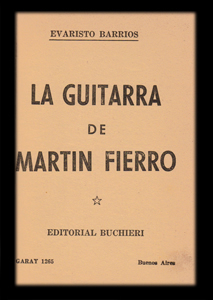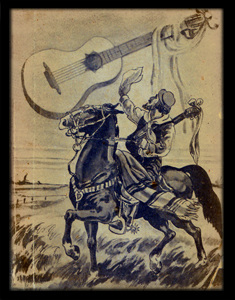By
Evaristo Barrios’s autobiographical sketches

hard-to-find book of poems, La guitarra de Martín Fierro written by Evaristo Barrios became available to us. It was published by Buchieri in 1947. But what really turned out curious was the second part of it in which, with rhymed lines, he reveals unknown autobiographical aspects to which I refer below in prose.
 «I was born in Abasto (a town on the way to the city of La Plata) and became an orphan when I was two months old. I was brought up by a good sister of mine and her husband. The latter was also my godfather.»
«I was born in Abasto (a town on the way to the city of La Plata) and became an orphan when I was two months old. I was brought up by a good sister of mine and her husband. The latter was also my godfather.»
There he spent his childhood. Time later they moved to Magdalena and in the little town of Atalaya he spent his first fourteen years. At age fourteen he decided to go to a neighboring town which was six leagues from there, Bavio, where he worked as a laborer at a bakery. By that time he began a liking for reading and he either used to read Tolstoi or the anarchist Malatesta. And later when he was an adult he said: «Now that I’m going to the end of my days when I look back I realize that the fight for our fellow men is a lost case».
He was milkman, he knew how to handle a pitchfork and he finally arrived at Olavarría to work as a butcher. By then he was already singing. And then it was the time of his military service. Later he was journalist, he wrote things in his own way: «With my pen I always defended the noble working class. But because of that I was always teased throughout my lifetime».
The itinerant singer Martín Castro was always his guiding star. He went to Uruguay a large number of times always carrying a copy of Martín Fierro.
He recorded 170 numbers and he published twelve books. One day an older friend advised him that he should study music. And he did it, he taught himself with the different methods which were published. They called him payador, later soloist and also artist and composer, but he was simply an interpreter of our popular song that sang what he really felt.
 «I had a flock of sweethearts, like parrots in a corn plantation, cheating gossipers, who, in sum, were good for nothing. Those who seemed to be the less unselfish ones asked for marriage».
«I had a flock of sweethearts, like parrots in a corn plantation, cheating gossipers, who, in sum, were good for nothing. Those who seemed to be the less unselfish ones asked for marriage».
He earned a lot of money, maybe a million pesos (a fabulous figure in 1947); but his money was gone like the wind. He confesses that his friends were no more than a handful, including his brother.
In Uruguay, in the town of Florida he run a farm which was three leagues far from the railway station because he had made money again. It was called La chiquita. But finally, as he was not born to lead, he returned to what he liked.
The count Nicolás de Barrios, a native of San Lúcar de Barrameda arrived in this country and married Feliciano Chiclana’s daughter, named Victoria Catalina. From this marriage his father was born, who in 1868 married a descendant of General Oribe. This is his ancestry.